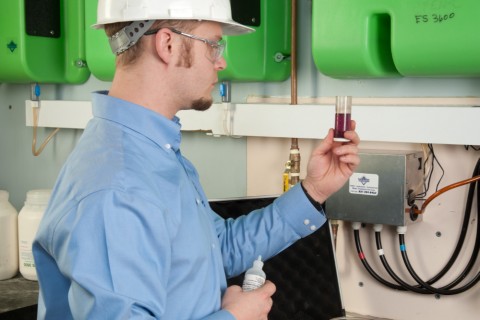Liquid drums of chemicals have been around for decades in the water treatment industry. These days, you may be hearing more about solid chemistry. Solid chemistry is essentially the same chemical formulations manufactured into a solid paste concentrate. Although the chemicals are the same, their different form comes with a lot of changes in manufacturing, handling, and utilizing the chemicals when it comes to water treatment.
Interesting, isn’t it? (Well obviously we think so!) There’s more. A lot more! Here’s everything you need to know about solid chemistry and its benefits.
1. It has the same chemical functionality.
In the manufacturing process, water is removed from the chemical formula, creating a highly concentrated, solid-compact solution solidified into discs, tablets, or even packaged in recyclable plastic jugs. Even though solids are smaller and lighter, their high concentration gives them the same chemical power as liquids. Solids are dissolved on-site at the point of the application using a dissolver manufactured explicitly for the solid chemistry products.
2. It has broad usage capabilities.
Solid chemistry is a sustainable, safe, and easy form of water treatment for cooling, boiler, and closed loop systems to prevent scale, corrosion, and biological fouling from damaging systems.
3. It’s lighter.
Liquid chemicals typically reside in 55-gallon drums. Just one gallon of liquid is about 9 pounds. We’ll do the math for you – these drums of chemicals are nearly 500 pounds. 500 pounds of anything is difficult to ship and handle. 500 pounds of hazardous chemicals is even more difficult to ship and handle.
The same concentrated chemical formulations found in a 500-pound drum of liquid chemistry are about 44 pounds per case of solid chemistry. So, just a little bit lighter, huh? You can safely hold one package of solids in one hand. Not to mention more compact, making it easier to ship, easier to store, and even easier to move and handle at your site.

4. It’s safer.
Transporting liquid chemistry — whether in shipping or on site at your facility — comes with the risk of potentially dangerous chemical spills and offensive odors and fumes. With its lightweight, compact form, solid chemistry eliminates the risk of spilling and splashing chemicals, while also decreasing workplace injuries and hazards by eliminating the need to transport, store, and handle large chemical drums.
In its solid form, these chemicals are considered non-hazardous. Although handling requires thorough attention and care, handling solids doesn’t require special safety training for you and your team.
5. It’s quicker.
So much to do, so little time. Think about how much effort, time, and manpower it takes to move 500 pounds. What about something much lighter – just 44 pounds?
Not only does solid chemistry save time in handling, it also saves time in application. It’s placed directly into the dissolver to begin the treatment process, and remote monitoring can then be used to determine dosage accuracy. It also eliminates the need for pump priming with the use of flooded suction.
6. It’s more cost efficient.
Solid chemistry also saves money. Solids are lighter, and are classified as non-hazardous, so they are less expensive to ship than liquids, about 90% less in fact. Take a look:
CINCINNATI TO NEW YORK
Liquids $394.67
Solids $18.51
CINCINNATI TO LOS ANGELES
Liquids $357.67
Solids $36.36
LOCAL SHIPMENT
Liquids $128.56
Solids $15.62
And, solid chemicals rid you of hidden costs like additional chemical containment, drum disposal costs, service time, pump priming, and more!
7. It’s locally made.
We work with local company and long-time partner AP Tech to provide solid chemistry to our clients. As a small, family-owned business, it’s important to us to keep our dollars local.
So, who is AP Tech? They were founded in 2002 and their manufacturing facility is headquartered in West Chester, Ohio. AP Tech works with more than 200 water treatment companies worldwide and has installed more than 20,000 solid chemistry solutions.
Our collaborative partnership of over 20 years with AP Tech enables us to provide technical training and education to you and your team.
8. It’s better for the environment.
In the manufacturing process, AP Tech uses the EPA’s Principles of Green Chemistry for safety, efficiency, and conservation. In the shipping process, solids decrease diesel fuel usage by 2.5 gallons per shipment. In the application process, solids decrease water usage by eliminating the need for rising drums and increased cycles of concentration.
9. You can switch from liquids to solids.
We made all of that seem pretty appealing, right? The good news is that you can make the switch from liquid to solid chemistry, and in most cases it’s an easy switch!
Solids work synergistically with liquid formulations so during a transition, you convert to the new control parameters once solids are brought online. To install a solids program, you need wall space or a panel-mount arrangement and plumbing to bring water to the unit. Chemical pumps are mounted below dissolvers and a short run of suction tubing is all that is required.

10. Solid Blend is here to help.
Have more questions about solid chemistry? Wondering what it would look like to make the switch at your facility? Let’s chat.
It is our goal to create the safest and most sustainable Water Treatment Plan for your facility by providing further solid chemistry education and any necessary on-site visits from the Solid Blend and AP Tech team.

